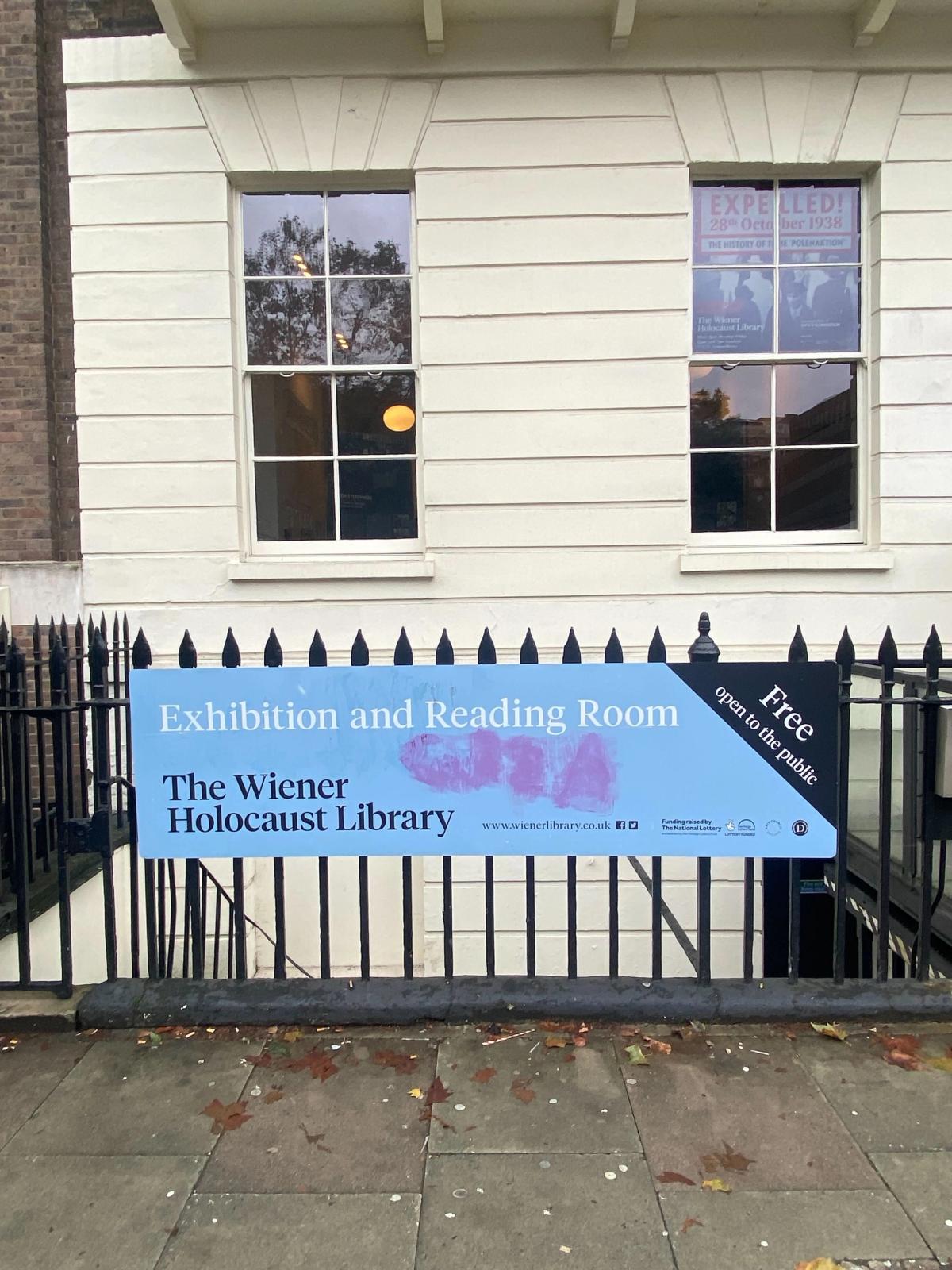The word “Gaza” has been spray-painted onto the world’s oldest cultural institution dedicated to the memory of the Holocaust.
Staff at the Wiener Holocaust Library in Russell Square, London, found the graffiti on the morning of Thursday 2 November.
In a statement shared with The Art Newspaper, the library’s director, Toby Simpson, said: “We’ve been deeply concerned by this act of vandalism at the library. It was obviously intended to cause damage and distress. To lash out against Israel by targeting a Holocaust institution is not only stupid and wrong, it is an action that can only make sense to antisemites and their enablers."
The graffiti, sprayed onto a sign at the entrance of the library, was discovered the morning after numerous pro-Palestinian demonstrations were staged across London.
The vandalism took place amid news that Israeli forces have encircled Gaza City in the country's escalating conflict with Hamas, which has so far reportedly claimed more than 9,000 Palestinian lives. Israel's military action in the Gaza Strip was launched in the aftermath of Hamas's 7 October terrorist attack, when its fighters crossed into Israel on a murderous rampage, killing more than 1,400 people and taking around 220 hostages.
The library was founded in 1933 by Alfred Wiener, a German journalist and academic who originally trained in Arabic Studies. It celebrated its 90th year this year.
Wiener, who grew up in Potsdam, Germany, arrived in Britain after the Nazi party launched the Kristallnacht pogrom against Jewish people in November 1938. Although Wiener dedicated a large part of his career to exposing antisemitism before, during and after the Holocaust, he also gained a doctorate in Islamic Studies. He was an expert in Arab literature and, earlier in his career, worked as a translator with the German army in Palestine.
Wiener’s grandson, Daniel Finkelstein, a journalist for The Times newspaper, said in a post on X, formerly Twitter, that his grandfather “cared deeply about Arab people”.
He added: “I’m so upset by this graffiti attack on my grandfather’s library. To see his Holocaust archive vandalised in this way suggests an attack on Jews not a critique of Israel. It’s dismaying.”
Simpson said in the statement that the Wiener Library will add the vandalised sign to the library’s collection of antisemitic material, so it will be catalogued and preserved as part of the library's holdings.
"We have now removed the sign and are accessioning it to our collection as yet another example of antisemitic harassment, the type of which we have been collecting and documenting for 90 years," Simpson said.
"However, we have also received an immense outpouring of support, from partner organisations, politicians, historians, researchers who have benefited from accessing our collections, and from people whose own family documents have been entrusted to us. We believe this sends a strong message that the proliferation of antisemitic hate we are witnessing cannot and must not be allowed to prevail."
The library holds some of the earliest first-hand accounts of the Holocaust from its survivors. It is home to large archives of Nazi documents and photographs and hundreds of unique collections relating to the experiences of Jewish refugee families who came to Britain in the 1930s and 1940s.
But, according to a statement on its website, the library defines its mission as just not being concerned with the Holocaust per se but to “genocide, their causes and consequences”.
“The library provides a resource to oppose antisemitism and other forms of prejudice and intolerance," the statement says.
Earlier this year, the library made headlines when it hosted an event in support of asylum seekers. During a talk, Enver Solomon, the director of the Refugee Council, revealed that Robert Jenrick, the UK minister for immigration, had demanded home office staff remove murals designed to create a welcoming atmosphere for children at detention centres for asylum seekers.


